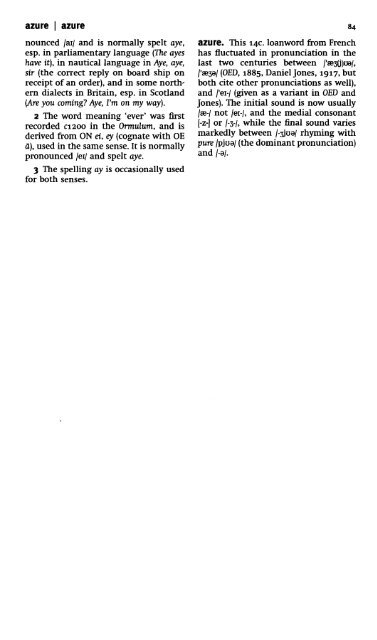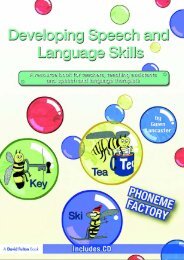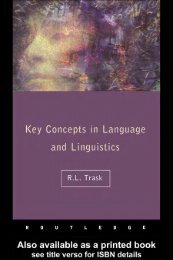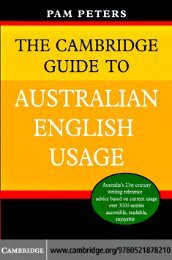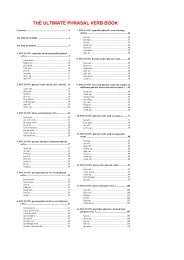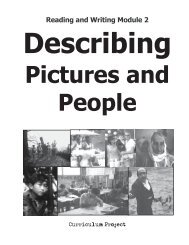- Page 5:
THE NEW ¿Wow/er?s Modem English Us
- Page 8 and 9:
OXFORD UNIVERSITY PRESS Great Clare
- Page 10 and 11:
CONFLICTING VIEWS Ours is a Copious
- Page 12 and 13:
PREFACE TO THE THIRD EDITION (thoug
- Page 14 and 15:
PREFACE TO THE THIRD EDITION verbs,
- Page 16 and 17:
PREFACE TO THE THIRD EDITION the po
- Page 18 and 19:
Dedication, 1926 To the memory of m
- Page 21 and 22:
Abbreviations and Symbols t obsolet
- Page 23 and 24:
Bibliographical Abbreviations Alfor
- Page 25:
xxi BIBLIOGRAPHICAL ABBREVIATIONS W
- Page 28 and 29:
a, an | a, an 2 Opinion is divided
- Page 30 and 31:
abductor | -able, -ible 4 the purpo
- Page 32 and 33:
-able, -ible | -able, -ible 6 can b
- Page 34 and 35:
abolishment | about 8 was no room i
- Page 36 and 37:
absolute construction | absolute po
- Page 38 and 39:
Academe | accent 12 kind, for examp
- Page 40 and 41:
accessary, accessory | accidently 1
- Page 42 and 43:
accountable | acerb, acerbic 16 of.
- Page 44 and 45:
act, action | activate, actuate 18
- Page 46 and 47:
adamant | -ade 20 captandum present
- Page 48 and 49:
adjectivally | adjective adjoining
- Page 50 and 51:
adjudicator | administer 24 classif
- Page 52 and 53:
adopted, adoptive | advance 26 them
- Page 54 and 55:
adversary | advertise 28 in English
- Page 56 and 57:
advocate | aegis, aeon 30 Charles V
- Page 58 and 59:
affirmative | afterward(s) 32 affir
- Page 60 and 61: aggressor | agreement 34 people mar
- Page 62 and 63: agricultur(al)ist | aid 36 major da
- Page 64 and 65: air I aitch 38 not. When the negati
- Page 66 and 67: albino | alibi 40 is a master in hi
- Page 68 and 69: allegro | allow 42 serious realism
- Page 70 and 71: allusion, allude | alongside 44 sen
- Page 72 and 73: although, though | ambience 46 exam
- Page 74 and 75: amenity | amok, amuck 48 amenity, l
- Page 76 and 77: amphiboly | anagoge 50 and'. The si
- Page 78 and 79: anastrophe | and 52 voyce of the Lo
- Page 80 and 81: angina | Anglo 54 by many writers,
- Page 82 and 83: Antarctic, Antarctica | anticipate
- Page 84 and 85: any | any 58 entering the country b
- Page 86 and 87: apodosis | apostrophe 60 ridan -> e
- Page 88 and 89: appal I appeasement 62 5 Pronouns.
- Page 90 and 91: apprehend, comprehend | aqu-, acqu-
- Page 92 and 93: archetype | aristocrat 66 travailet
- Page 94 and 95: arouse | as 68 In the face of such
- Page 96 and 97: as I as 70 In all other circumstanc
- Page 98 and 99: as ... as, so ... as | aside, a sid
- Page 100 and 101: association | assure, ensure, insur
- Page 102 and 103: -atable | -ative, -ive 76 only'. Th
- Page 104 and 105: au I authentic, genuine 78 of journ
- Page 106 and 107: avant-garde | aver personal object)
- Page 108 and 109: await, wait | away 82 Magazine sugg
- Page 112 and 113: acklog I bad 86 and related words,
- Page 114 and 115: alance | ballade 88 balance. The nu
- Page 116 and 117: an I bar 90 ban (verb). From a pres
- Page 118 and 119: arbecue | barrage 92 difficult to s
- Page 120 and 121: ased on | bas-relief 94 has mainly
- Page 122 and 123: -b-, -bb- | be 96 projecting from t
- Page 124 and 125: ean | beau geste 98 hears, or one i
- Page 126 and 127: ecause of | beccafico 100 he was po
- Page 128 and 129: eholden | belly 102 father—Antoni
- Page 130 and 131: ereaved, bereft | bestir 104 to inf
- Page 132 and 133: etween | between 106 1 The nation i
- Page 134 and 135: ide I black 108 ... keep me from my
- Page 136 and 137: lended, blent | bloody 110 ( = Oxfo
- Page 138 and 139: lusher | bon mot 112 and repetitive
- Page 140 and 141: other | bottom line 114 1 both ...a
- Page 142 and 143: avado | brier, briar 116 bravado /b
- Page 144 and 145: occoli | buffet 118 compound of cas
- Page 146 and 147: urden, burthen | but 120 burden, bu
- Page 148 and 149: uy I buy 122 by road hut that he kn
- Page 150 and 151: Ce cabbalist(ic), cabbala, etc. in
- Page 152 and 153: camelopard | cannot 126 Camelopard,
- Page 154 and 155: capitalist | capitals 128 capitalis
- Page 156 and 157: carburettor | caring 130 N. Africa
- Page 158 and 159: casein | cases 132 only case 1 has
- Page 160 and 161:
cashew | catachresis 134 On this ev
- Page 162 and 163:
cater | cavalcade 136 cater (verb).
- Page 164 and 165:
celebrant | centre 138 (e.g. extend
- Page 166 and 167:
cerulean | chaise longue 140 Dexter
- Page 168 and 169:
charisma | checkmate 142 charlatan.
- Page 170 and 171:
children's language | chivalry 144
- Page 172 and 173:
Christian name | -dation, -tiation
- Page 174 and 175:
cirrus | daim 148 and 'in (the) cir
- Page 176 and 177:
dean, cleanly | clench, clinch 150
- Page 178 and 179:
climactic | close, closely 152 21,
- Page 180 and 181:
cloven. See CLEAVE 1 . clue. See CL
- Page 182 and 183:
coiffeur, coiffure | colander 156 T
- Page 184 and 185:
college I collocation 158 china, cu
- Page 186 and 187:
colosseum | come-at-able, get-at-ab
- Page 188 and 189:
comma | comma 162 3 Where and, hut,
- Page 190 and 191:
commiserate | compare 164 crossover
- Page 192 and 193:
complacent, complaisant | complex 1
- Page 194 and 195:
comptroller | computerese 168 compo
- Page 196 and 197:
conch I confer 170 Examples; (claus
- Page 198 and 199:
conjunctive | consequent, consequen
- Page 200 and 201:
considerateness, consideration | co
- Page 202 and 203:
constructive | contact clauses 176
- Page 204 and 205:
content(ment) | continually, contin
- Page 206 and 207:
contractual | contrast 180 (without
- Page 208 and 209:
convert | corbel 182 Among the most
- Page 210 and 211:
corpuscle | correspond 184 corpus o
- Page 212 and 213:
cotemporary | council, counsel 186
- Page 214 and 215:
court-card | crash 188 Fowler (1926
- Page 216 and 217:
crenel | crevasse, crevice 190 (OED
- Page 218 and 219:
crucifixion | culture 192 of State'
- Page 220 and 221:
cy J Czech 194 common as a general
- Page 222 and 223:
darkle | darkling 196 comic, or oth
- Page 224 and 225:
datable | dean, doyen 198 with a si
- Page 226 and 227:
decimate | deduction 200 decisive m
- Page 228 and 229:
definite, definitely | degree 202 a
- Page 230 and 231:
demagogue | demotic English 204 dem
- Page 232 and 233:
deponent | derring-do 206 deponent.
- Page 234 and 235:
designedly | detract, distract 208
- Page 236 and 237:
diachronic | dialogue 210 diachroni
- Page 238 and 239:
didn't ought | different suttee he
- Page 240 and 241:
diffuse I dilettante 214 2 Occas. c
- Page 242 and 243:
disbar | discuss 216 disbar. See DE
- Page 244 and 245:
disinterest | disinterested 218 It
- Page 246 and 247:
disremember | distinct, distinctive
- Page 248 and 249:
ditransitive | do 222 ditransitive.
- Page 250 and 251:
do I do(e)st 224 hardly ever used i
- Page 252 and 253:
donation | double negative 226 not
- Page 254 and 255:
double subject | doubling of conson
- Page 256 and 257:
doubtless, no doubt, undoubtedly |
- Page 258 and 259:
drown | due to 232 heart leaps up w
- Page 260 and 261:
durst I dysentery 234 durst. See DA
- Page 262 and 263:
earn | ebullient 236 'It might have
- Page 264 and 265:
•èd, -éd | -edly 238 -èd, -éd
- Page 266 and 267:
effete | egoism, egotism 240 of pro
- Page 268 and 269:
•eity I eke out 242 chance, or de
- Page 270 and 271:
elegy | ellipsis 244 (W. Watson (18
- Page 272 and 273:
else I emergent 246 of the difficul
- Page 274 and 275:
enamel | endemic, epidemic 248 (OE
- Page 276 and 277:
engraft, ingraft | enormity, enormo
- Page 278 and 279:
has been investigation enough: the
- Page 280 and 281:
environs | epenthesis 254 fabhen an
- Page 282 and 283:
epistemic modality | epoch 256 epis
- Page 284 and 285:
equerry | -er and -est, more and mo
- Page 286 and 287:
ergo I escalate 260 same case)... I
- Page 288 and 289:
espionage | -esque 262 especial is
- Page 290 and 291:
-est I Estuary English 264 or endea
- Page 292 and 293:
ethnie | -ette 266 person no more t
- Page 294 and 295:
euphuism | even 268 'An Outline His
- Page 296 and 297:
every | everyone 270 4 ever so. Pre
- Page 298 and 299:
evolve I except 272 in learned work
- Page 300 and 301:
excusable | exoteric and exotic 274
- Page 302 and 303:
ex post facto | exterior, external,
- Page 304 and 305:
eyrie 278 but aerie is also commonl
- Page 306 and 307:
facilitate | factious, factitious,
- Page 308 and 309:
fair, fairly | falsehood, falseness
- Page 310 and 311:
fantasy, phantasy | faro 284 fantas
- Page 312 and 313:
farther, further | farther, further
- Page 314 and 315:
fauna, flora | faze 288 standard no
- Page 316 and 317:
fecal, feces | feel 290 into the in
- Page 318 and 319:
female, feminine; womanlike, womanl
- Page 320 and 321:
festal, festive | few 294 filmfest,
- Page 322 and 323:
fiducial, fiduciary | filigree 296
- Page 324 and 325:
finish I fish 298 finish (adj.). =
- Page 326 and 327:
fixation | flair 300 2 (Also to fix
- Page 328 and 329:
flautist, flutist | flotsam and jet
- Page 330 and 331:
flyer | folk 304 flyer. The recomme
- Page 332 and 333:
foramen | forbid 306 be preceded by
- Page 334 and 335:
foreword, preface | formalism, form
- Page 336 and 337:
formula | fortuitous 310 formula. I
- Page 338 and 339:
founder | framework 312 founder. Se
- Page 340 and 341:
French words | French words 314 ind
- Page 342 and 343:
frolic I fuchsia 316 formal garment
- Page 344 and 345:
fulsome I function 318 ambiguity wo
- Page 346 and 347:
fuselage | -fy 320 fuselage. Pronou
- Page 348 and 349:
galley | gallows 322 galley. 1 Moli
- Page 350 and 351:
garage | gay 324 dollar gap (1948),
- Page 352 and 353:
genesis | gentle 326 or imagination
- Page 354 and 355:
German | gerund 328 German, a membe
- Page 356 and 357:
geyser | gild 330 indispensable in
- Page 358 and 359:
girlie | gladsome 332 songs remain
- Page 360 and 361:
glossary, dictionary, vocabulary |
- Page 362 and 363:
gobemouche | godlily 336 area and t
- Page 364 and 365:
gotten I gourmand, gourmet 338 What
- Page 366 and 367:
-gram | gram(me) 340 Rogers esplana
- Page 368 and 369:
greenhouse effect | grill, grille 3
- Page 370 and 371:
guild I guy 344 various other uses
- Page 372 and 373:
Hh h. 1 The presence or absence of
- Page 374 and 375:
half-past I hand 348 of speech: as
- Page 376 and 377:
hard words 350 1 hard and hardly. E
- Page 378 and 379:
haven | he 352 rising. In such cons
- Page 380 and 381:
heaps I hedonist, Cyrenaic, Epicure
- Page 382 and 383:
helmet | help 356 he'teu/, which I
- Page 384 and 385:
henna | hereby, herein, hereof, her
- Page 386 and 387:
hiatus I himself 360 hiatus. A term
- Page 388 and 389:
historical | hoi polloi 362 more of
- Page 390 and 391:
homoeo- | Hon. 364 homoeo-. Words w
- Page 392 and 393:
hopefully | housewife 366 theoretic
- Page 394 and 395:
humanist | hussy 368 human (noun) t
- Page 396 and 397:
hyperbaton | hyphens 370 hyperbaton
- Page 398 and 399:
hysteron proteron 372 hysteron prot
- Page 400 and 401:
ibidem | -ics 374 seize, their. For
- Page 402 and 403:
idolatry | if 376 idolatry. See-iAT
- Page 404 and 405:
ill I illiteracies 378 examples of
- Page 406 and 407:
imaginary, imaginative | immovable
- Page 408 and 409:
impawn | important 382 impawn. See
- Page 410 and 411:
imprint | in- and un 384 1626) and
- Page 412 and 413:
in back of | incidentally 386 words
- Page 414 and 415:
incognito | incongruous vocabulary
- Page 416 and 417:
incur | indirect question 390 with
- Page 418 and 419:
indivisible | infer 392 editors of
- Page 420 and 421:
infinitude | inflammable 394 in whi
- Page 422 and 423:
ing I ingratiate 396 imbue (with so
- Page 424 and 425:
innumerate | in order that 398 medL
- Page 426 and 427:
insanitary, unsanitary | insist 400
- Page 428 and 429:
instinct | insular 402 Milton) of i
- Page 430 and 431:
intended | inter- 404 magazine unle
- Page 432 and 433:
intermezzo | internecine 406 interm
- Page 434 and 435:
in the circumstances | intransitive
- Page 436 and 437:
intrinsic | inure, enure 410 but oh
- Page 438 and 439:
inverted commas | involve 412 Pope;
- Page 440 and 441:
Iran | ironically 414 in the groups
- Page 442 and 443:
irrecognizable, un- | irrespective
- Page 444 and 445:
isagogic I -ise 418 Mag., 1830; All
- Page 446 and 447:
issue I it 420 occasionally: e.g. P
- Page 448 and 449:
-ite I -ize, -ise in verbs 422 wate
- Page 450 and 451:
li jabot. Pronounce /'3aebau/. jack
- Page 452 and 453:
jargon 426 of experience ought to a
- Page 454 and 455:
Jew I jollity, jolly 428 Jew (and r
- Page 456 and 457:
ju-jitsu I just 430 judicious, clea
- Page 458 and 459:
Kk kadi. See CADI. Kaffir. Historic
- Page 460 and 461:
kinda | knee 434 types I kind of th
- Page 462 and 463:
know I kudos 436 know. Now striking
- Page 464 and 465:
LI laager. Pronounce /'la:ga/. lab,
- Page 466 and 467:
lamina | large, largely 440 lamina.
- Page 468 and 469:
later on | Latin plurals 442 held o
- Page 470 and 471:
laudable, laudatory | lawman 444 2
- Page 472 and 473:
lead, led | leap 446 expression has
- Page 474 and 475:
leave, let | legalese 448 it, the f
- Page 476 and 477:
legend | lengthways, lengthwise 450
- Page 478 and 479:
-less I lest 452 of quantity is dom
- Page 480 and 481:
leukaemia | leverage 454 (1), Yours
- Page 482 and 483:
libertine | life 456 that it should
- Page 484 and 485:
like I like 458 meaning 'the proces
- Page 486 and 487:
-like I -lily 460 have liked to run
- Page 488 and 489:
Uniment | litany, liturgy 462 subdi
- Page 490 and 491:
literary words | litotes 464 refere
- Page 492 and 493:
Lloyd's I loath 466 2 The 20C. has
- Page 494 and 495:
loggia I long variants 468 'song' (
- Page 496 and 497:
loom I Lord 470 to he protected—H
- Page 498 and 499:
lovelily | lunging 472 mind that ma
- Page 500 and 501:
Mm ma'am. See MADAM. macabre. Prono
- Page 502 and 503:
Magyar | majority 476 Magyar. It is
- Page 504 and 505:
malign, malignant | mandarin 478 ma
- Page 506 and 507:
mantelpiece, mantelshelf | marginal
- Page 508 and 509:
massage | materialize 482 massage.
- Page 510 and 511:
maybe | maybe 484 sceptical terms t
- Page 512 and 513:
meander | means 486 Stephanie at th
- Page 514 and 515:
measles | meiosis 488 press coverag
- Page 516 and 517:
menstruum | Messrs 490 menstruum /'
- Page 518 and 519:
metathesis | metope 492 to the thir
- Page 520 and 521:
midst I million 494 suggesting an e
- Page 522 and 523:
minority | Miocene 496 necessity, h
- Page 524 and 525:
misquotations | mitigate 498 printe
- Page 526 and 527:
modal verb | monachal, monastic, mo
- Page 528 and 529:
monologue | more 502 simply as 'an
- Page 530 and 531:
Moslem | mostly 504 Moslem /'mDzlam
- Page 532 and 533:
moustache | much 506 moustache /ma'
- Page 534 and 535:
muslin | mute e 508 muslin makes mu
- Page 536 and 537:
my I myth 510 my. 1 For my or your
- Page 538 and 539:
names and appellations 512 further
- Page 540 and 541:
natter | nauseated, nauseating, nau
- Page 542 and 543:
nectar | needle 516 to cook in, and
- Page 544 and 545:
negotiate | neither 518 negotiate.
- Page 546 and 547:
nepenthes | never 520 language. OCE
- Page 548 and 549:
Nicene | nineties 522 sign, however
- Page 550 and 551:
noblesse | nom de guerre 524 the Pr
- Page 552 and 553:
nonchalant, nonchalance | nonpareil
- Page 554 and 555:
normalcy | not 528 normalcy. 'Norma
- Page 556 and 557:
not 530 what agreeing to differ may
- Page 558 and 559:
nought I noun and adjective accent
- Page 560 and 561:
nth I numeracy 534 into colloquial
- Page 562 and 563:
Oo -O is a suffix of combining form
- Page 564 and 565:
oblique stroke | observance, observ
- Page 566 and 567:
octoroon | -o(e)s 540 a pedantic En
- Page 568 and 569:
of 542 manœuvre his armies in mass
- Page 570 and 571:
of a | officialese 544 expected, e.
- Page 572 and 573:
officinal | off of 546 most. But th
- Page 574 and 575:
omelette | on 548 Herodotus) it ref
- Page 576 and 577:
one 550 produced in each case by a
- Page 578 and 579:
only 552 only spake three words": w
- Page 580 and 581:
onward, onwards | opposite meanings
- Page 582 and 583:
-or I order 556 me—P. P. Read, 19
- Page 584 and 585:
ornament | other 558 ornament. The
- Page 586 and 587:
ottava rima | ought 560 and) + othe
- Page 588 and 589:
ours, our | outstanding 562 ours, o
- Page 590 and 591:
overlook, oversee | owing to 564 ov
- Page 592 and 593:
Pp pace (prep.). Derived from Latin
- Page 594 and 595:
pamphlet | pantaloons, pants 568 pa
- Page 596 and 597:
paralogism | parataxis 570 paralogi
- Page 598 and 599:
partance | parsing 572 as maladie d
- Page 600 and 601:
participles | particular 574 Moving
- Page 602 and 603:
party | passive territory 576 label
- Page 604 and 605:
past I pasty 578 prior, 1154), but
- Page 606 and 607:
pay off | pedantic humour 580 pay O
- Page 608 and 609:
pelvis I pentameter 582 pelvis. The
- Page 610 and 611:
peradventure | percentage 584 equiv
- Page 612 and 613:
perforce | peripeteia 586 given eas
- Page 614 and 615:
persistence, persistency | persona
- Page 616 and 617:
personification | perspic- 590 to r
- Page 618 and 619:
petitio principii | phenomenal 592
- Page 620 and 621:
Phoebe, Phoenician, phoenix | phras
- Page 622 and 623:
physicist | piebald, skewbald 596 o
- Page 624 and 625:
pinkie | Plain English 598 pinkie i
- Page 626 and 627:
plead I plenty 600 plead. The pa.t.
- Page 628 and 629:
plurality | plus 602 plurality. See
- Page 630 and 631:
poetic, poetical | political correc
- Page 632 and 633:
pomade | poof 606 slavery in the ex
- Page 634 and 635:
Porch I possessive with gerund 608
- Page 636 and 637:
possible I post hoc, ergo propter h
- Page 638 and 639:
-p-, -pp- I practice, practise 612
- Page 640 and 641:
précis I préfectoral, prefectoria
- Page 642 and 643:
premature | prepared to 616 prematu
- Page 644 and 645:
prepositions | prepositions 618 wor
- Page 646 and 647:
present | present writer, the 620 o
- Page 648 and 649:
prevaricate | preventive, preventat
- Page 650 and 651:
principal, principle | pristine 624
- Page 652 and 653:
problematic, -atical | program, pro
- Page 654 and 655:
prolific I pronouncedly 628 nutriti
- Page 656 and 657:
pronunciation | pronunciation 630 p
- Page 658 and 659:
proper terms | prophetess 632 had a
- Page 660 and 661:
prospect I protagonist 634 Jyaet wa
- Page 662 and 663:
protester | provost 636 syllable. B
- Page 664 and 665:
psychosis | punctuation 638 'operat
- Page 666 and 667:
purpose I pur sang 640 purporting t
- Page 668 and 669:
Qq qua /kwei/. This useful word is
- Page 670 and 671:
question mark | quiet 644 2 For the
- Page 672 and 673:
quiz I quotation marks 646 using or
- Page 674 and 675:
Qur'an | q.v cweÔan to say). When
- Page 676 and 677:
acoon | rallentando 650 no one is g
- Page 678 and 679:
ates | rather 652 rates (pi. noun).
- Page 680 and 681:
e(-) I reaction 654 No 50 Box Stree
- Page 682 and 683:
eason why | received pronunciation
- Page 684 and 685:
Rechabite | recipient 658 find the
- Page 686 and 687:
ecognizance | recto 660 recognizanc
- Page 688 and 689:
e-enforce | refute 662 properly nee
- Page 690 and 691:
egenerate | relate 664 regenerate.
- Page 692 and 693:
elict I renegade 666 man, we rely u
- Page 694 and 695:
epetition | repetitional, repetitio
- Page 696 and 697:
epulsive | resolution, motion 670 r
- Page 698 and 699:
espirable, respiratory | restrictiv
- Page 700 and 701:
evenge | révisai 674 to this day.
- Page 702 and 703:
hythmic, rhythmical | right 676 wor
- Page 704 and 705:
oast I roentgen 678 Paternoster Row
- Page 706 and 707:
ondo | rosin 680 An example: root,
- Page 708 and 709:
out, route | rubbish 682 rout, rout
- Page 710 and 711:
Ss -S. l For the use of -s to form
- Page 712 and 713:
sailor | same 686 is involved. Much
- Page 714 and 715:
sanction | 's and of-possessive 688
- Page 716 and 717:
sapient | Sassenach 690 as it smell
- Page 718 and 719:
save I scampi 692 seaport in E. Geo
- Page 720 and 721:
scavenge | schismatic, schismatical
- Page 722 and 723:
Scotch, Scots, Scottish | séance,
- Page 724 and 725:
seeing | self- 698 e.g. Seeing as h
- Page 726 and 727:
Semite | sensible, sensitive, susce
- Page 728 and 729:
sentence adjective | sentence adver
- Page 730 and 731:
seraglio | sestet 704 and the secon
- Page 732 and 733:
sextet I shall and will 706 1985; S
- Page 734 and 735:
shamefaced | she 708 the 16c. onwar
- Page 736 and 737:
shier | short, shortly 710 synonyms
- Page 738 and 739:
shrivel | sice, size, syce 712 shru
- Page 740 and 741:
simile | single most 714 in their t
- Page 742 and 743:
sitting-room | slacken 716 vehicles
- Page 744 and 745:
sled, sledge, sleigh | slow-worm 71
- Page 746 and 747:
sneak | so 720 life in the language
- Page 748 and 749:
sobriquet | soccer 722 standard use
- Page 750 and 751:
socker | solo 724 least by Gowers h
- Page 752 and 753:
somebody, someone | sometime, somet
- Page 754 and 755:
soprano | Soviet 728 stress has mov
- Page 756 and 757:
specs I spelling 730 eye'. From the
- Page 758 and 759:
spelling I spelling 732 books, news
- Page 760 and 761:
Spencerian | spill 734 For Dickens'
- Page 762 and 763:
spirt I split infinitive 736 remark
- Page 764 and 765:
splodge, splotch | Spoonerism 738 C
- Page 766 and 767:
St I starlight, starlit 740 2 Words
- Page 768 and 769:
stemma | still life 742 to stem fro
- Page 770 and 771:
stop I straight, strait 744 t, k) i
- Page 772 and 773:
stroma | subjunctive mood 746 of th
- Page 774 and 775:
submerge | subtle 748 the thought;
- Page 776 and 777:
suchlike | suffixes added to proper
- Page 778 and 779:
suffragette | sumac 752 by with few
- Page 780 and 781:
supersede | suppressio veri 754 lea
- Page 782 and 783:
surprisal | sustain 756 surprisal.
- Page 784 and 785:
swinging | symbolic, symbolical 758
- Page 786 and 787:
synopsis | syzygy 760 or "two meani
- Page 788 and 789:
take I -t and -ed 762 The list of e
- Page 790 and 791:
tartan | tax, duty 764 steak and ki
- Page 792 and 793:
teenager | temporary, temporarily 7
- Page 794 and 795:
terminate | terza rima 768 an airpo
- Page 796 and 797:
-th I thankfully 770 word after tha
- Page 798 and 799:
that 772 previously. It may also be
- Page 800 and 801:
that 774 language is the way in whi
- Page 802 and 803:
theatre | them 776 before the secon
- Page 804 and 805:
thereat | there you go 778 include
- Page 806 and 807:
think I -th nouns 780 him or her to
- Page 808 and 809:
thru I till, until 782 speech—T.
- Page 810 and 811:
timpani | tiro 784 times less (Men
- Page 812 and 813:
together with | tonsil 786 together
- Page 814 and 815:
total I trade marks 788 total. The
- Page 816 and 817:
transfixion | transpire 790 -ABLE,
- Page 818 and 819:
trefoil I trilogy 792 century'. Sim
- Page 820 and 821:
triumvir | troop 794 triumph in any
- Page 822 and 823:
truffle I try and, try to 796 catgu
- Page 824 and 825:
tuberose | twilight 798 tuberculous
- Page 826 and 827:
tyke, tike | Tyrrhene, Tyrrhenian 8
- Page 828 and 829:
uglily I -urn 802 Are the requisite
- Page 830 and 831:
unashamedly | unattached participle
- Page 832 and 833:
unbias(s)ed | underway 806 unbias(s
- Page 834 and 835:
uninterest | unique 808 for the mos
- Page 836 and 837:
unlike | unparliamentary expression
- Page 838 and 839:
until I up 812 The ambition became
- Page 840 and 841:
upon I us 814 the perfectly service
- Page 842 and 843:
usherette | uvula 816 use(d) to ...
- Page 844 and 845:
valley | various 818 valley. Pi. va
- Page 846 and 847:
vehement, vehicle | verbal 820 shel
- Page 848 and 849:
verdigris | verse 822 common use. H
- Page 850 and 851:
-ves I vicegerent 824 is a grey are
- Page 852 and 853:
viewpoint | virile 826 With the (or
- Page 854 and 855:
visit I vogue word 828 visit (verb)
- Page 856 and 857:
vortex I vulnerable 830 vortex (whi
- Page 858 and 859:
waltz, valse | want 832 element bei
- Page 860 and 861:
Watergate | ways 834 waste paper is
- Page 862 and 863:
weave | well 836 weave (verb). Alth
- Page 864 and 865:
Welsh I wharf 838 1991 ; He found t
- Page 866 and 867:
what 840 following quotations the n
- Page 868 and 869:
wheal I whereabouts 842 wheal. See
- Page 870 and 871:
which 844 of this). Some examples o
- Page 872 and 873:
whirr | whither 846 whirr, (make) c
- Page 874 and 875:
who and whom 848 accompany wyth tho
- Page 876 and 877:
why I will 850 steamer ... whose ca
- Page 878 and 879:
wish I without 852 3 New use of -wi
- Page 880 and 881:
-woman | word order 854 -woman. The
- Page 882 and 883:
worry | worser 856 kempt, and sheve
- Page 884 and 885:
wreak | Wykehamist 858 words. Wroth
- Page 886 and 887:
Yy -y. For the suffix used in makin
- Page 888 and 889:
youth I -yse, -yze 862 fellers when
- Page 890 and 891:
-z-, -zzby those who have some know
- Page 892 and 893:
PREFACE TO THE SUPPLEMENT 866 World
- Page 894 and 895:
PREFACE TO THE SUPPLEMENT 868 • W
- Page 896 and 897:
SUPPLEMENT In cross-references * in
- Page 898 and 899:
SUPPLEMENT 872 influence of the pla


